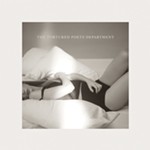Page Two: We Hold These Truths to Be Self-Evident
Free speech: Do we have to spell it out for you? Plus, farewell to a great American filmmaker.
By Louis Black, Fri., Nov. 24, 2006

Okay, so the response to the "Page Two" on the Dixie Chicks ("The Time of the Toad," Nov. 3) was a little surprising. I did leave out a crucial sentence or two that should have said something along the lines of:
"It is the unencumbered and unquestionable right of any individual to have stopped or stop listening to the Dixie Chicks, or to any act for any reason, and/or to decide to stop buying or to get rid of their records."
"Right" isn't even the correct word, in that it suggests this is some kind of public concern or constitutionally endowed privilege. It isn't. It is such an inherent, natural law that in most ways it should be so obvious that it needn't even be pointed out – though perhaps, given the gist of the column, it was needed.
The point was not about individuals and personal opinions. Rather, it was about overt political grandstanding on a relatively minor issue as a way of inflaming passions. The insistent, unrelenting attacks on the Dixie Chicks by right-wing media, especially talk radio, went on for so many months and were so aggressively vehement that they made it seem as though Benedict Arnold and Tokyo Rose, by comparison, were untarnished patriots. In so many ways this situation was ideal for talk radio, in particular, as it was dependent on the pitting of good guys against bad guys – on untarnished, near-holy white battling a pure black so purposefully evil as to lack any redeeming qualities. This was the right-wing media's deliberate use of what Natalie Maines said to further its repellent stirring of Americans to hate other Americans.
Isn't there anger and annoyance at the amount of media manipulation involved here, regardless of one's point of view? I certainly resent it when liberal politicians or organizations try to drum up a deep, emotional response all out of proportion to an issue.
This is not to suggest an organized conspiracy. Whether or not this was an intentional, or simply a convenient, assault on free speech is beside the point – as is whether or not it was a conscious attempt to silence the war's critics, because the results certainly leaned in that direction. If you believe the response was reasonable and organic, then you should have no concerns.
"Just so you know, we're ashamed the president of the United States is from Texas." This is what Maines said to the audience at the end of a concert in Europe. Maines had no long history of political activism or overt support of progressive causes. She was not politically very active and outspoken like Susan Sarandon, Barbra Streisand, or Jane Fonda, which is not to in any way criticize them. It was one joke.
Now, part of my concern over the letters responding to my editorial on the matter was the message from some readers that, by questioning their take on the Chicks, I was doing exactly what I was attacking. One letter stated, "I do not see this article as championing free speech for all – rather it defends expression of only one side in this particular argument. The Dixie Chicks have the freedom to say and do anything they choose. Should not their fans be afforded equal freedom?"
I was also castigated for bringing up free speech, as if I were citing – and misunderstanding – the Bill of Rights. "If Louis Black, at this late date, can't distinguish between a government deliberately destroying the careers of people who speak out against it vs. an audience choosing not to buy an artist's CDs or concert tickets because they disagree with the artist's statements – or even because a voice on a radio tells them not to – there's probably no hope for him."
"Page Two" did not and would not suggest censoring anyone or denying individuals their right to say, do, and/or think what they want, not just even but especially if it is odious to my point of view. Still, as an act of intellectual engagement and dissent, shouldn't I be able to disagree, even violently disagree, with public dialogue?
The column made it explicit that none of its arguments was based on the Bill of Rights. Instead, it was about the need for free speech (without capital letters), without censorship or fear of retaliation, in a free society.
Criticism is not censorship, expressing concerns is not demanding legislation, and disagreeing with people is not telling them to shut up. This column raises issues, and if people contemplate them in any way, even to quickly dismiss them, that is all and the best that ever can be expected.
Come on; "Just so you know, we're ashamed the president of the United States is from Texas"? That statement is so unacceptably extreme that it requires a severe and massive reassessment? As much as so many insist otherwise, including letter-writers in response to my column, I do have the hardest time imagining that more than a few of those casually watching or reading the news were so offended by the statement that it mobilized them into militant, anti-Chicks action. Instead, I think they were stirred up by the media frenzy, as country radio tripped over itself to bash the Chicks and talk-radio hosts damn near fainted in their pleasure at this perfect topic.
Now, I'm sure most would say that this hysteria had nothing to do with their very personal and independent opinions and that arguing otherwise just illustrates my elitist, ivory-tower condescension toward the mass of patriotic Americans. Actually, as much as the nature and extent of manipulation scares me, I'd be just as worried if I believed that some of us had become so intolerant of differing points of view, no matter how mild, that this nationwide anti-Chicks frenzy was spontaneous.
One of talk radio's most hypocritical conceits, on its astonishingly full menu of the same, is that its participants are not part of the media elite – nor, evidently, are most of the owners and/or major shareholders in most important American media companies. Evidently, in order to be in the elite, one must be a liberal (i.e., an anti-American, anti-democracy, communist traitor), even though in reality that category has always been, by definition and constitution, largely conservative. Talk-show hosts who publish bestselling books, host TV shows, and are regularly covered by the nation's press insist that they are just humble truth-tellers, in no way part of the "media elite." Humpty Dumpty would be impressed by this (mis)use of language.
Coupled with this contradiction is the truly schizophrenic posturing of talk-radio hosts. Out of one side of their mouths, they brag about having enormous popularity and influence, shown by the incredible ratings of their nationally broadcast shows, which are so loved by the vast majority of true Americans. Out of the other side, they insist that the conservative right has no public voice because mass media is controlled by liberals (there is not room here to dispute that politicized, partisan fantasy). The daily symptom of this pathology is that each host asks why the topics they are talking about that day are not being aired or discussed anywhere else but on his/her program. As they all discuss essentially the same topics, by the end of the day, hearing that bragging lament about some widely aired issue would be funny if it weren't so manipulative. Disingenuously, they also ask why such-and-such topic is being ignored by the mainstream press when, almost always, it isn't.
Although a rather minor example, a letter in Tuesday's Austin American-Statesman clearly illustrated this contradiction. It queried as to why there has been no media coverage on the record of and accusations against Rep. John Murtha, only to conclude, as though it were just too obvious, that of course it was because he's a Democrat. This indulges in the right-wing fantasy that the press only questions and attacks Republicans, giving Democrats a free ride. The only way to entertain this nonsensical fiction is not to read or listen to any mainstream press. Murtha's record, as well as Rep. Nancy Pelosi's judgment, were both explored and questioned in mainstream media ranging from The Washington Post to The New York Times, from network news to NPR. But why trouble anyone's position with facts?
Regardless of where any assault on free speech comes from – be it left-wing students shouting down a speaker, progressives trying to get some song banned, or any attempt to censure radio for what is said – I am opposed to it. But this definitely includes the widespread assault on free speech and on an uninhibited flow of information by this administration. I can disagree with something, even vehemently, but I absolutely defend its right to be spoken.
I also don't vet my cultural tastes based on any creative talents' politics. Toby Keith is a great songwriter, Charlie Daniels a terrific performer, and the action films of any number of political reactionaries are among my favorites.
And, as in the quote at the very beginning of this column, my deep, lifelong passion for the work of John Wayne knows no reasonable bounds, and certainly suffers no ideological constrictions.
This morning I was awakened by a phone call that informed me that Robert Altman had died. Altman was a true giant of American film; despite any number of commercial disappointments, he kept making films throughout his life. No matter what films he had done recently, he could never be written off, because he had one of those great talents that thrived on new challenges. Influential, innovative, and a true actor's director, Altman made any number of classics; even some of his weakest films are fascinating to watch over and over because of the intelligence behind them. Thinking of his films, I feel a genuine sense of awe and inspiration. I have some serious issues, especially with the later films, as I think in many of them Altman didn't like his characters. This critical concern on my part testifies to his extraordinary achievements: The films were so unique, rich in character, difficult to listen to in terms of dialogue, thematically complex, and often both enthralling and engrossing narratively that they welcome any number of thoughts and readings. Always active, never less than brilliant, Altman led a full life, boasted a rich career, and always kept working. The last both mitigates and intensifies one's sense of loss at his death.










